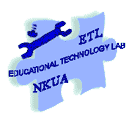

Film Collection > Plenary Talks
Wired, But Not Connected Dr. Boris Berenfeld |
||
| (click here to watch the video) | ||
Much money has been spent linking schools to the Internet, but are students actually connected intellectually? Do they harness the Internet for anything more than retrieving additional content? This paper introduces a new instructional model that we call telecollaborative inquiry in which connectivity recasts how students learn. Telecollaborative inquiry builds communities of networked classrooms that engage students in distributed, collaborative knowledge-construction. Mirroring professional and scientific communities of practice, this paradigm leverages Internet connectivity, technologies, and social networking to teach content and foundational skills like critical thinking, communications, information literacy, and teamwork. It enables synchronized investigations that produce datasets and intellectual discourse that are richer than what individual classrooms can deliver. It has the power to transform education and justify the investments in wiring schools. Telecollaborative inquiry-based curriculum was first piloted in the 1990s as the Global Lab project in 30 countries and today, an updated version of Global Lab (v.3.0) deploying Web 2.0 advances is being piloted in 150 upper-elementary classes throughout Russia with plans to scale worldwide. Based on these trials, the developers are innovating a scaffolded curricular design based on granular instructional modules called Global Learning Units (GLUs™). Each GLU converts a specific instructional topic into a bite-sized telecollaborative investigation, providing all the resources and tools needed to deliver telecollaborative inquiry. When aligned with instructional objectives, the progression of GLUs covers the scope, sequence, and content of traditional curricula, building science content and process skills more effectively than single-classroom inquiries. Tightly integrating content, data collection and analysis, and student communications into a Web-based curricular infrastructure, GLUs provide the framework and scaffolding to make telecollaborative inquiries a reality in mainstream science classrooms. They offer educators a strategy for implementing telecollaborative inquiry-based curricula that will enable students across mainstream education to construct the knowledge and skills necessary for achievement in higher education and professional endeavors. |
||
 |
Hosted by Educational Technology Lab @ National and Kapodistrian University of Athens |